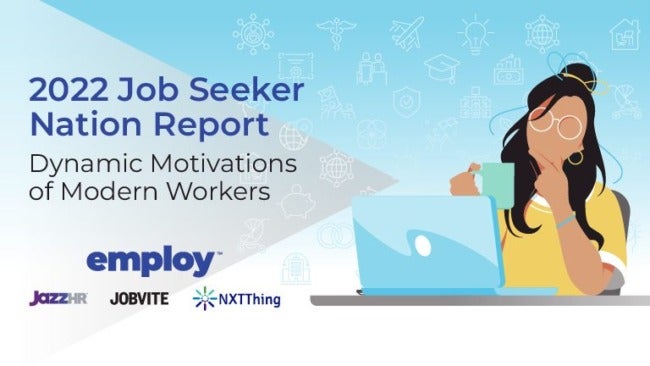This year’s annual Job Seeker Nation Report is out and it’s clear the labor market has entered an entirely new reality. Priorities and expectations in the workplace have drastically shifted over the past year as the dynamic motivations of the modern workforce continue to dominate the hiring landscape.
With millions of available jobs in the U.S. and talent seeking roles that better align with their own requirements, workers are making it clear they want more from employers — and they feel empowered to ask for it. Today’s job seekers are leveraging their upper hand to secure new jobs, higher wages, and better benefits.
The job market shift has left many organizations struggling to engage and retain top talent. The 2022 Job Seeker Nation Report will help recruiters and employers understand how to adapt to the current reality of talent acquisition to remain competitive in today’s labor market.
About the Job Seeker Nation Report
For the last 13 years, the Job Seeker Nation Report has surveyed and examined the responses of workers to understand their preferences and experiences within the labor market. This year, Employ, the parent company of Jobvite, JazzHR, and NXTThing RPO, is excited to provide insights and key takeaways about job seekers within the most difficult hiring environment in history. Let’s dig into a few of the biggest findings from this year’s report.
State of the job market
While 62% of workers are satisfied with their jobs, many employees report having one foot in and one foot out of their organizations.
- 45% are actively looking for a new job or plan to within the next year
- 32% feel comfortable quitting a job without having another lined up
- 30% have left a job within the first 90 days of starting
- 23% have changed industries since the onset of the pandemic
Given the tight labor market, companies must prioritize internal mobility, as 54% of workers who are actively looking for a job have not looked at their current company for a new position.
Organizational turnover
The confidence among workers’ job prospects has left many workers dealing with the negative impact of high organizational turnover.
- 40% have experienced high employee turnover at their organization over the past year
- 40% also report their own workload increasing due to high employee turnover
- 56% of workers who experienced high employee turnover did not receive an increase in payment or salary to compensate for the workload increase
This organizational turnover has also led to an increase in stress levels and feelings of burnout in 78% of workers. However, the number of employers offering mental health benefits and resources is at the lowest level in the past three years.
Money and compensation
Only 37% of workers feel they are paid fairly, so employers who fall short on compensation expectations may see an increase in turnover or candidate rejection.
- 67% want higher compensation from their employer today
- 38% selected compensation as the top reason for leaving a job in the past year
Workers who are comfortable negotiating salaries (71%) and asking for raises (63%) is also at an all-time high. However, 35% of workers who were denied a raise request left the job because of it, and nearly half of workers believe they could make more money by simply switching jobs.
Remote work
As companies evaluate return to workplace plans, remote work opportunities continue to be important to workers.
- 65% said remote work is important in their decision to accept or reject a job
- 40% would be willing to accept a lower salary to work remotely
- 30% said their ideal work situation/set up is 100% remote
Even with an increased desire among job seekers to work remotely, company culture remains critical.
- 52% believe that, in an increasingly remote work environment, company culture is just as important as ever
- 55% said they would leave a new job if the culture was not aligned with their expectations or values
Download the Full Report for More Insights
These are just a few takeaways from the 2022 Job Seeker Nation Report. Get a copy of the report today for hundreds of additional findings and insights that will help talent acquisition professionals and employers understand how to adjust to this employee-driven job market.




